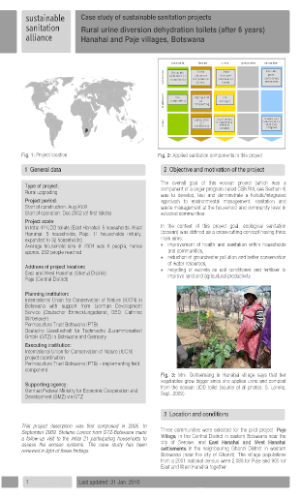Rural urine diversion dehydration toilets (after 6 years) Hanahai and Paje villages, Botswana - Case study of sustainable sanitation projects
Werner, C., Klingel, F., Bracken, P., Schlick, J. (2010)

Published in: 2010
Publisher:
Sustainable Sanitation Alliance (SuSanA)
Author:
Werner, C., Klingel, F., Bracken, P., Schlick, J.
Uploaded by:
SuSanA secretariat
Partner profile:
common upload
11705 Views
163 Downloads
Location of library entry
Content - Summary
This case study is about household rural upgrading by introducing UDDTs in households. In total 42 UDDTs were constructed serving approximately 252 people. This project was implemented by GTZ on behalf of the German Ministry BMZ.
Three communities were selected for the pilot project: Paje Village, and East Hanahai and West Hanahai settlements. Many pit latrines were found in Paje. Here people had concerns about groundwater pollution, and in the past, boreholes had been closed because of groundwater pollution caused by pit latrines. In East and West Hanahai, on the other hand, people generally did not have any toilets and hence were practising open defecation. All three communities were generally unaware of water toilets and not skeptic towards dry toilets.
The communities were informed about three different types of “ecosan toilets”, namely urine diversion dehydration toilet (UDDT), Arborloo, and composting toilet. The households chose the UDDT to be the most feasible solution. In the adapted solution the urine was collected in a container situated within the vault or outside and was available for reuse. The system was complemented by a composting unit for processing and hygienising the faecal matter that was emptied out from the collection chamber. Greywater (used household wastewater) is often collected and applied directly to the trees etc. This practice was further supported by the project.
The results of the ecosan project in Paje and East and West Hanahai Villages have been mixed. The project worked hard at developing a participatory grass-roots programme and at incorporating sustainability-oriented mechanisms such as community contribution and ownership. However, it also faced the difficult challenges of poverty, an ingrained dependency syndrome on external aid, and taboos on reuse of excreta.
Bibliographic information
Werner, C., Klingel, F., Bracken, P., Schlick, J. (2010). Rural urine diversion dehydration toilets (after 6 years) Hanahai and Paje villages, Botswana - Case study of sustainable sanitation projects. Sustainable Sanitation Alliance (SuSanA)
Filter tags
Case studies in SuSanA template English Faeces or faecal sludge Rural Sub-Saharan Africa Urine Urine diversion dehydration toilets (UDDTs)















